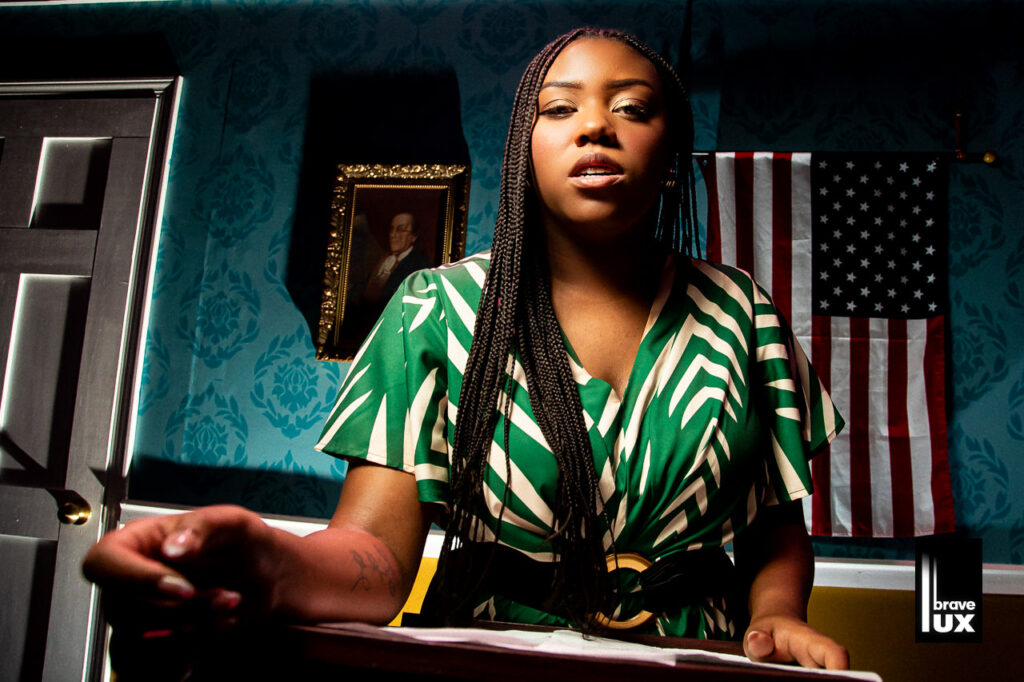“Cunt.”
The first word spoken lands like a slap in Loyola’s Laboratory Underground Theater.
It’s not spoken in jest, nor tossed off casually, but delivered as the spark igniting playwright Selina Fillinger’s farce “POTUS: Or, Behind Every Great Dumbass Are Seven Women Trying to Keep Him Alive.”
The insult — uttered by the unseen President of the United States to his wife in front of three diplomats — sets off a geopolitical chain reaction, hurtling the play into a whirl of chaos. Nuclear powers are on edge, a gala meant to celebrate women teeters on disaster and through it all, the president, who never appears onstage, is incapacitated by an anal abscess.
The work of saving him — and by extension the country — falls to seven women — Harriet, Jean, Stephanie, Dusty, Bernadette, Chris and Margaret.
Their frantic maneuvering explodes in the small Underground space where a wall of portraits of men hang, not one woman around them. Onstage, however, it’s only women who move, shout, scheme and sweat. The contrast is the production’s visual thesis — men may hang on the walls, but women keep the machinery running.
“When Selina Fillinger wrote this play, it was actually during the Biden administration,” said Assistant Director Willa Henske, a third-year theater major. “Her intention was actually not to make it about any specific president, and I think that’s very important when looking at this show as a whole, because it is for the audience to interpret themselves.”
Directed by Alice Da Cunha, the sold-out show — which ran Sept. 25-Oct.2 — turns Fillinger’s 2022 Broadway script into a tightly wound college production. The president in the show is partyless, a cipher who blunders equally through issues of abortion, guns, foreign diplomacy and optics.
The play, as actors and crew stressed, is not about a particular man, but about all of them.
The vagueness becomes part of the comedy, and also part of the sting. Corrin Friese, a third-year theater major who understudied three of the roles, pointed out the ambiguity written into the show’s warnings.
“There’s this one scene where characters are running around and saying individual bits and pieces, but the final lines of that moment are, ‘Who is running this country?’” Riley Townsend, a third-year film major said. “We don’t even know who this person is. It’s almost like this is reality. You don’t see him. There is no president almost.”
 “POTUS” has an all-female cast, which some members described as “empowering.” (Courtesy of Joe Mazza)
“POTUS” has an all-female cast, which some members described as “empowering.” (Courtesy of Joe Mazza)
What emerges in the chaos is a study of the invisible labor of women as the women spin and shout frantically to contain a disaster they didn’t cause. Harriet, the president’s chief of staff, controls the crisis from the shadows. Margaret, the first Black First Lady, performs tireless public service while being reduced to her wardrobe in the press.
“Women like Margaret, who already have systemic injustice put against them, have to work twice as hard to get into these positions, and they still go unnoticed,” Henske said. “Margaret mentions all the universities she’s graduated from, all the charities she’s done, and the only thing the public can focus on is what shoes she’s wearing. As silly as it sounds, that’s very much prevalent in real life.”
For Townsend, the comedy jabbed at a deeper topic.
“There is this whole discourse about women shouldn’t be running this country because they’re too dramatic or have too many emotions,” Townsend said. “But in this, we are dramatic. We do have a lot of emotions, and it almost makes us more logical in that sense. It’s clear these women are smarter. They work harder than anyone.”
Constant slamming of doors, stomping of feet and yells vibrated in the theater as the cast portrayed the image of a woman angry, not because of who she is, but because of who she works under.
The Underground Theater production leaned into these heightened emotions while keeping the humor buoyant.
“What makes it such a good play and such a hilarious play is that there is so much drama,” Friese said. “Their emotions are so heightened, but it all roots from the dumbassery the president has initiated. That’s why they’re upset. That’s why they’re stressed.”
While skewering power, “POTUS” also interrogates gender roles. In rehearsals, cast had conversations about the fear of women being replaced by younger men in the work office, even when the women are more qualified, according to Henske.
“Society’s thought [is that] women, once they get a certain age, are no longer fresh,” Henske said. “Or once they become a mother in particular, that our only purpose is motherhood, serving men.”
Townsend said she found the all-female cast liberating.
“I felt really good about not having any male presence in the show,” Townsend said. “What we see in the news is so many men doing so much stuff. And we never really hear about anyone behind the scenes, especially the women behind the scenes. I felt really good about telling the story about the women behind the scenes.”
The production ended not with triumph, exactly, but with survival — women holding up a nation insisting on falling apart, a gallery of forgotten labor under a gallery of male mediocracy.
The cast and crew said they saw freedom not just in the script — but in each other.
“One way to describe it is that we all are very empowered,” Henske said. “And I think it is so important that empowered women empower others.”

